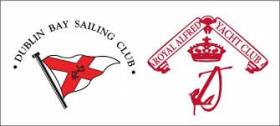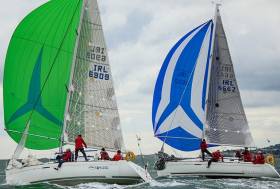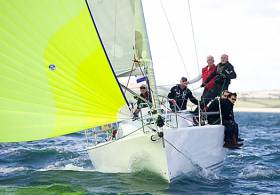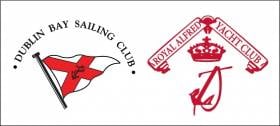Displaying items by tag: Royal Alfred Yacht Club
Royal Alfred Yacht Club Tankard Discovered in Cobh House Clear-Out Poses Questions
A reader from Cork Harbour has reached out to Afloat in the hope of garnering more information about a silver tankard he recently stumbled upon.
John Crosbie was clearing out his house in Cobh when he discovered the Royal Alfred Yacht Club tankard, engraved with the words "Corinthian Match", 26 July 1884 Ulerin.
The tankard originally belonged to his great-grandfather or great-great-grandfather, Atwell Hayes Allen, who were both members of the Royal Cork Yacht Club.
The RAYC tankard was from a large Clyde-built yacht, and Crosbie is asking Afloat readers for more information about this particular race or why his family would have been involved in it.
 The RAYC tankard dating back to 1884 that was discovered in Cobh
The RAYC tankard dating back to 1884 that was discovered in Cobh
As regular Afloat readers know, the RAYC is the world's oldest, specifically amateur yacht club and was founded in 1857. The RAYC merged with Dublin Bay Sailing Club (DBSC) in 2016, as Afloat reported here
John's appeal coincides with the annual handout of RAYC silverware in Dun Laoghaire this weekend at the DBSC and ISORA silverware, as Afloat reports here.
For generations, the RAYC was an umbrella organisation linking yacht racers from the rival harbours of Dun Laoghaire and Howth. It provided an attractive programme of regattas, complementing more local and national events.
As locally known, the' Alfred' played a seminal role in the evolution and formation of racing in sailboats worldwide. A short list of its "firsts" places the club as the original model for yacht clubs worldwide, to a much greater extent than most older clubs.
If you have any information to help John Crosbie solve this mystery, please contact him via [email protected].
Update Saturday 11th November: Reader Patrick O'Donovan quickly supplied two contemporary newspaper articles reporting Ulerin's 1884 Corinthian Match success.
Both the Freeman's Journal and The London Evening Standard gave details of the Royal Alfred Yacht Club racing below:
 The Freeman's Journal 28th July 1884. Ulerin came second, Tankards for the crew
The Freeman's Journal 28th July 1884. Ulerin came second, Tankards for the crew
 London Evening Standard August 18, 1884 (page 2, bottom right)
London Evening Standard August 18, 1884 (page 2, bottom right)
Clare Hogan RIP
It is with the greatest regret that we report the death of Clare Hogan, an extremely talented sailor - particularly in the International Dragon Class - who also gave much to sailing administration, having served as Commodore of the Royal Alfred Yacht Club in Dublin Bay.
Clare was a member of the Royal St. George Yacht Club and a keen Dragon ace campaigning her Dragons Aphrodite and Cloud in Dublin Bay and at various international Dragon events.
Tributes have been paid by Dublin Bay Sailing Club here
Funeral arrangements are here.
A full appreciation on Afloat.ie appears here
Our heartfelt thoughts and condolences are with her family and many friends.
RAYC Prizegiving Dinner Cancelled 'Due to Unforeseen Circumstances'
The Royal Alfred Yacht Club's Black–Tie Dinner scheduled for the National Yacht Club this Saturday has been cancelled 'due to unforeseen circumstances'.
The club's Bloomsday Trophies will be available for collection in the NYC admin office (downstairs) from Tuesday 6th December.
DBSC Honours RAYC Prizegiving With Black-Tie Dinner At National Yacht Club
Dublin Bay Sailing Club (DBSC) is honouring the Royal Alfred Yacht Club (RAYC) tradition by holding a Black-tie prizegiving dinner event next month.
The winners of the Bloomsday Regatta, which this year was held in conjunction with the NYC Regatta, will be presented with their trophies at the gala dinner at the National Yacht Club on Saturday, 3rd December.
As previously reported by Afloat.ie, the Two Dublin racing clubs came together in order to rationalise a crowded Dublin Bay yacht racing calendar a year ago next month. Dublin Bay Sailing Club (DBSC) and the Royal Alfred Yacht Club (RAYC), whose origins date back to the late 1800s, combined to reduce the 'very crowded calendar, reduced entries and duplication of effort that impacted on both the RAYC and DBSC.
Bookings (€50 per person) directly with the NYC.
ISORA Signs Up New Boats & New Sponsor for Offshore Season
The ISORA series this year promises extra spice with several new boats entering that could yet threaten the offshore dominance of the J109 design in recent seasons. The new boats on the scene are Kuba Szymanski’s 40.7, Grant Kinsman’s Sigma 400, Robert Floate’s Sydney 36 and there are whispers of a JPK 10.8 entering ISORA too.
This year is also Round Ireland Race year and this brings additional boats to take part in obtaining their required level of experience to qualify for this epic offshore race. Any boat considering doing the Round Ireland Race can qualify by taking part in the ISORA races prior to the Round Ireland in June.
ISORA's four race coastal series, run in conjunction with the Royal Alfred Yacht Club that merged this season with Dublin Bay Sailing Club, will be sponsored by Viking Marine. It is the latest sponsor into the offshore scene with Avery Crest still the title sponsors for the Overall Offshore Series. ISORA also have race sponsors such as Adrian Lee & Partners, LC Tyres and Irish Hospital Supplies. ISORA are finalising sponsorships for other races too.
All ISORA races will be tracked using the Avery Crest YB trackers. This allows the race to be followed by using the YB app or on the Internet.
The first ISORA race will be a coastal race on the 23rd April, starting and finishing in Dun Laoghaire.
As well as providing great racing, ISORA also promotes a great social activity amongst the all the crews taking part, particularly after the Coastal Races. There is always a get “get together” in the National Yacht Club where crews from all participating boats mingle and chat about the day’s activities.
It is also hoped that UCD and Trinity Sailing Clubs will again provide crew to boats taking part in ISORA this season.
Any queries relating to taking part in ISORA can be forwarded to ISORA Chairman: Peter Ryan at [email protected]
The worst kept secret in Dublin sailing circles became public after a Royal Alfred Yacht Club EGM last night voted in favour of the motion 'that the Royal Alfred Yacht Club be incorporated into Dublin Bay Sailing Club'. The proposal was passed by an overwhelming majority of RAYC members present.
'Dublin Bay Sailing Club incorporating Royal Alfred Yacht Club' – Is This The New Name for Yacht Racing in the Capital?
There may well be a new name for yacht racing on Dublin Bay this season as merger talks between Dublin Bay Sailing Club (DBSC) and the Royal Alfred Yacht Club (RAYC) continue.
RAYC Flag Officers meet tonight in Dun Laoghaire to discuss the proposition of incorporating the historic club into the rival race organisation, DBSC.
According to an Afloat.ie source the proposals include a new name: 'Dublin Bay Sailing Club incorporating Royal Alfred Yacht Club' as well as the transfer of some historic yachting silvereware to the expanded DBSC. The RAYC will get a seat at the DBSC committee table to ensure the 'ethos' of the RAYC is preserved, according to the source. Two regattas per year will race under the RAYC burgee or its name at least and any RAYC monies left over after any wind up will be put towards an improved computerised results service for Dublin Bay racers.
As Afloat.ie reported previously the merger talks flagged for January come after years of deliberation.
Dublin Yacht Racing Clubs DBSC & RAYC To Discuss Merger in 2016
Two of Dublin's leading yacht racing clubs are in talks over a possible merger in order to rationalise a crowded Dublin Bay yacht racing calendar. Dublin Bay Sailing Club (DBSC) and the Royal Alfred Yacht Club (RAYC), whose origins date back to the late 1800s, have agreed to sit down and discuss the best way forward given the current 'very crowded calendar, reduced entries and duplication of effort that is impacting on both the RAYC and DBSC.
The link-up would modify the racing programmes of over 3,000 sailors and solve fixture clashes in the countries most popular race area.
At a Committee meeting of the Royal Alfred Yacht Club held last night it was agreed that the committee should enter into discussions with DBSC with a view to exploring and possibly rationalising the existing situation in Dublin Bay.
A small sub-committee was charged with investigating the options available to address these problems up to and including incorporation of the RAYC within DBSC. RAYC Commodore Barry MacNeaney said 'At all times being mindful of the necessity of preserving the unique heritage and tradition of the Royal Alfred'.
DBSC have indicated that they are open to discussion on this initiative and a meeting is scheduled to be held in early January with a view to having any agreement in place before the 2016 sailing season.
Similar talks have been held before with no real outcome. Thirteen years ago David O'Brien revealed merger talks in the Irish Times here
Tim Goodbody Is Afloat.ie 'Sailor Of The Month' For November
Veteran Royal Irish YC sailor Tim Goodbody is the Afloat.ie “Sailor of the Month” for November for his enormous contribution to Irish and international sailing over many decades, both as an active participants, as a race organiser, and as an administrator of leading sailing organisations.
By locating the award in November 2015, we highlight the fact that at the Dublin Bay SC Annual Prize-Giving on November 15th in the Royal St George YC, three generations of the Goodbody family received major awards. Grandson Max took The Mitchell Trophy in the RS Feva with granddaughter Georgia crewing, while son Richard - in partnership with Rick Johnson racing the International Dragon Diva - won the Oxford & Cambridge Cup, the Old Time Cup, and the RIYC Cup. And Tim himself, in his final season with the Sigma 33 White Mischief (he has now moved on to a J/109), won the J.B.Stephens Trophy, the Bective Lights Crystal Trophy, and the Fireseal Sigma 33 Trophy.
Both Tim and Richard were overall winners in their respective classes in the combined DBSC Thursday and Saturday season-long series. But while this shows the family’s devotion to Dublin Bay sailing, both White Mischief and Diva were also seen in major events at other venues, with White Mishchief taking second overall (by just two points) in Class 3 IRC at the ICRA Nats at Kinsale).
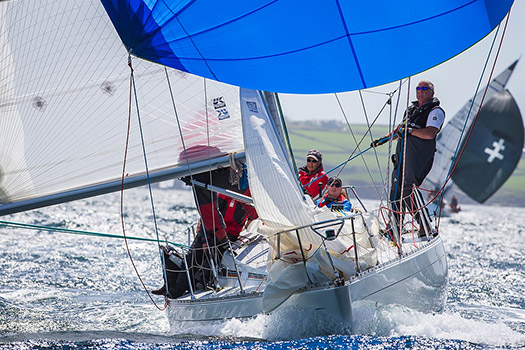
Although the Sigma 33 is not reckoned a favoured performer under IRC, Tim Goodbody still sailed White Mischief to a close second overall in IRC Class 3 at the ICRA Nats at Kinsale at the end of June. Photo: ICRA
The timing of the ICRA Nats at the end of June could just be fitted into Tim Goodbody’s busy schedule, for as Chairman of the Organising Committee for the Volvo Dun Laoghaire Regatta 2015 from July 9th to 12th, he was out of personal boat-racing for the next two weeks as the structures of the biggest sailing event in Ireland in many years swung successful into place, with the noted Goodbody light-but-effective management style keeping this very complex event moving smoothly forward to a happy conclusion.
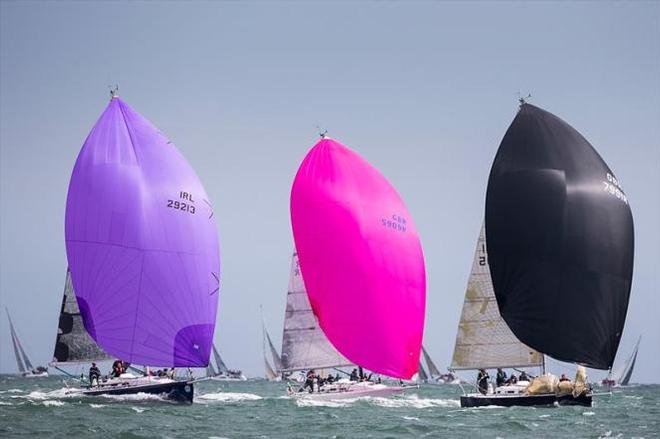
J/109s in full flight at the hugely successful Volvo Dun Laoghaire Regatta 2015, for which Tim Goodbody was Chairman of the Organising Committee. In 2016, he will himself be joining the J/109 class. Photo: VDLR
But then the depth of Tim Goodbody’s commitment to every aspect of sailing is unrivalled. He has campaigned successfully to international level in the Dragon, the J/24 and the Sigma 33, and as well he was lead helm on Irish Independent, the Dubois 40 which was the backbone of Ireland’s 1987 Admirals Cup team - our most successful AC squad ever, they placed fourth out of thirteen teams, while Irish Independent won the Fastnet Race overall.
Ashore, Tim Goodbody has served as Commodore of the Royal Irish YC, the Royal Alfred YC, and Dublin Bay SC, and for the latter organisation he was the mastermind behind the rationalization of the courses which enables an enormous fleet to race mostly in the southern half of Dublin Bay clear of the shipping lanes. His benefit to our sport is incalculable, but perhaps his greatest single contribution is the example he sets is in his own smoothly organised, quietly enthusiastic, very successful and highly enjoyable sailing.
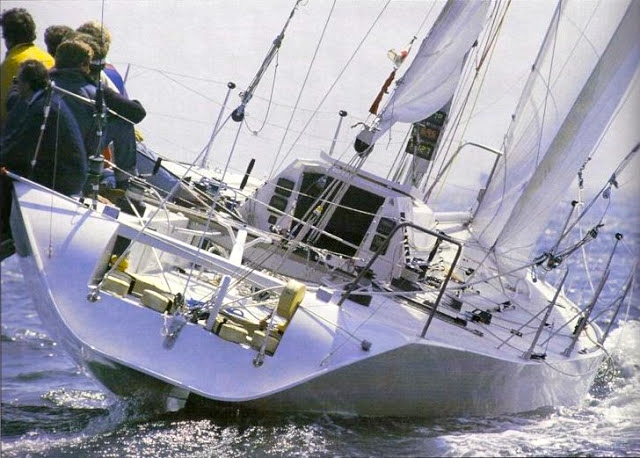 The Dubois 40ft Irish Independent racing in the Solent in the 1987 Admirals Cup. Somewhere in the middle of the tightly-packed crew is Tim Goodbody, and he is on the helm. During this series, he famously out-sailed the legendary Lawrie Smith on a sister-ship during a long tacking duel.
The Dubois 40ft Irish Independent racing in the Solent in the 1987 Admirals Cup. Somewhere in the middle of the tightly-packed crew is Tim Goodbody, and he is on the helm. During this series, he famously out-sailed the legendary Lawrie Smith on a sister-ship during a long tacking duel.
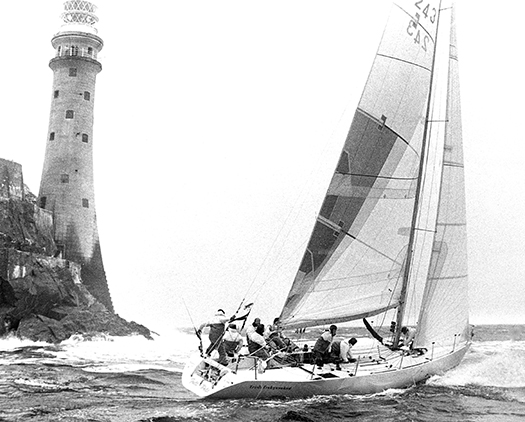 History is made. Irish Independent rounds the Fastnet Rock on Monday August 11th 1987, on her way to the overall win in the Fastnet Race.
History is made. Irish Independent rounds the Fastnet Rock on Monday August 11th 1987, on her way to the overall win in the Fastnet Race.



























